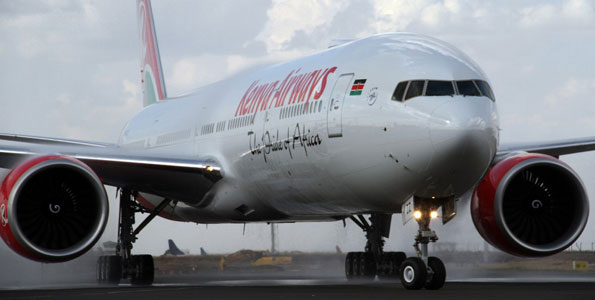
By LILIAN OCHIENG
Kenya is among four countries grafting a new aviation plan that could hand the ailing national carrier a new lease of life. Other countries are Uganda, Rwanda and South Sudan.
The four countries, which initially broke away from the East African Community to form the Northern Corridor Summit, are on the verge of concluding talks to form a one airspace area.
The plan was initially raised by South Sudan President Salva Kiir and his Ugandan counterpart Yoweri Museveni as a way of dealing with Kenya Airways’ high ticket prices.
However deliberations on the matter look set to turn around KQ’s fortunes.
Officials in charge of aviation in the ministries of transport of the four countries and their directors have agreed to liberalise the regional air space.
Effectively, the agreement could see Kenya Airways and RwandaAir, the only two operational national carriers, assume the role in the four countries opening them to bigger volume of business.
The two airlines will get full benefits of a national carrier in South Sudan and Uganda airspace.
Regional Director (Eastern and Southern Africa (ESAF) in the office of the International Civil Aviation Organisation (ICAO) Council, Mr Barry Kashambo said a liberalised airspace will reduce fares and increase flexibility in travel.
“The whole process is aimed at eliminating restrictions and providing guiding principles that will promote and ease movement of persons, goods and cargo by air,†Mr Kashambo told Smart Company by phone last week.
“The eligible operators such as those in Kenya will then access a wider market increasing their revenue.â€
Mr Joe Nyagah, the head of the Northern Corridor Integration Projects Summit in Kenya, said the arrangement would be fully operational by January 2016.
“We are hoping to get approval from heads of state. Ministers of Uganda, Kenya, Rwanda and South Sudan will approve the deal in a meeting set before the end of September,†said Mr Nyaga.
Presidential directive
Together, the four countries will negotiate air service agreements with foreign countries as one bloc.
The greatest benefit is expected to come from the classification of flights between the four countries as domestic, building on the recent move to allow use of national identification card as a travel document to ease movement within the bloc.
“Partner states should develop budgets and work plans for the establishment of a seamless Northern Corridor airspace bloc and report progress during the 11th summit,†said a directive signed by Presidents Uhuru Kenyatta, Paul Kagame of Rwanda, Yoweri Museveni and Salva Kiir at the June summit meeting in Kampala, Uganda.
The 11th summit was expected to have taken place this month but it was postponed due to tight schedule of the heads of state.
Those privy to the talks say Kenya has taken the lead role as this is now seen as a key strategy to revive the national carrier which recorded a staggering Sh25.7 billion loss in the 12 months to March 31, 2015.
The carrier attributed the loss to competition from Middle East carriers, high operating costs and cancellation of flights to West Africa.
“… this loss is obviously significant. It is, however, important to know that we have made significant investments at a time when the industry generally was going through hard times,†KQ Chief Executive Officer Mbuvi Ngunze said when he released the airline’s financial report.
Woes
A senate committee is currently inquiring into the troubles that are threatening to ground the airline.
The government through the National Treasury also plans a turnaround strategy that could see the board of Kenya Airways and the top management sent home.
The government is currently the largest shareholder in the airline, followed by KLM, the Royal Dutch Airlines. The huge loss has motivated Kenya to encourage other countries to speed up the talks.
At the Northern Corridor Summit discussions, fears are rife that RwandaAir or any other airline plying the East African region could face a similar setback.
According to Silas Udahemuka, Director-General, Rwanda Civil Aviation Authority (RCAA), liberalisation of the air space would reduce the cost of doing business and increase revenue for national carriers.
Under the East African Community, member countries already have a framework on the liberalisation of air transport.
It is envisioned that the application of the agreed framework will lift all barriers related to capacity, frequencies, city pairs, cabotage (the exclusive right of a country to operate the air traffic within its territory) and designation of airlines.
EAC Principal Aviation Officer Engineer Ladislaus Matindi said in a statement that member countries earlier on failed to agree on air space harmonisation.
Management issues
The bone of contention was whether there would be fair competition and a level playing field for both big and small airlines.
“Some Partner States with small and weaker airlines are concerned that full liberalisation may lead to the disappearance of their airlines as a result of anti-competitive behaviour such as abuse of dominant position by the bigger airlines,†Matindi said.
However, the headwinds that have buffeted KQ have awakened the region, with the Northern Corridor partners now warming to the agreement.
Regional countries currently rely on bilateral agreements to access each other’s air space.
Uncompetitive domestic and Bilateral Air Services Agreements (BASAs) regulatory regimes, fiscal policies such as airport taxes and limited subsidisation are to blame for the sector’s slow growth.
The sector is also highly subsidised globally, has high insurance premiums and suffers from management inefficiencies, security and safety concerns.
East African Business Council Executive Director Ms Lilian Awinja told Smart Company that a common air space arrangement will not only save KQ, but lay a vibrant business environment for regional carriers.
OP The East African



Recent Comments